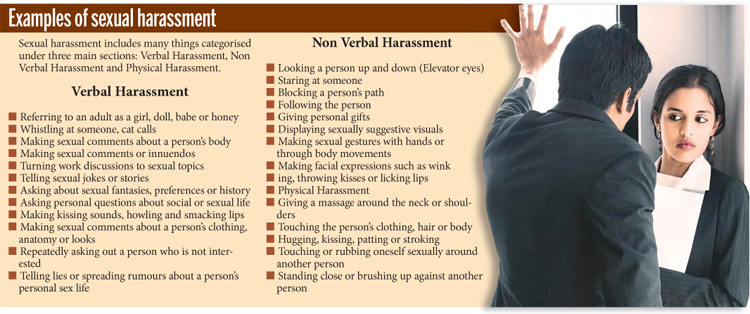|
Gender justice:
Taking recourse to the Law, an option
By Kurulu Kariyakarawana
Ouch he pinched my bottom shouted a good looking woman in the bus but
no one paid heed to her complaint.
 At the bus stop there was a commotion and it was found that some boys
were passing unruly comments at some school girls. eve teasing goes on
unabated . At the bus stop there was a commotion and it was found that some boys
were passing unruly comments at some school girls. eve teasing goes on
unabated .
Have you noticed young guys teasing girls whom they come across in
the streets or at public places? You must have definitely passed a
remark on the physical attributes of your office colleague of the
opposite gender or cracked jokes regarding sexuality. Maybe even tried
to brush against an unresponsive female in a crowded bus in an
unsuspecting manner.
But did you know that if that girl or office colleague or that
unresponsive female decided to react and seek justice in a court of law
and if proved guilty, you could be punished for sexual harassment and be
sentenced to five years rigorous imprisonment?
Well maybe to your surprise, the answer to that question is a
definite yes. But just listen to this, adults who caress children out of
love and affection could also face a shocker, if that child is misled
into believing that the adult was trying to take sexual advantage of him
or her and lodged a complaint , he or she faces the same music.
Unlike in the old days, schools nowadays conduct awareness programs
to educate children about adults who caress them in an inappropriate
manner.
The motive behind these awareness programs is to train children to
identify anyone who would touch an area of the body, that should not be
touched.
Because there are so many incidents reported of late where children
were being abused, harassed or molested sexually by adults under the
pretence of caring for the child.
|

Jeevanee Kariyawasam |
What if an adult who caresses a child not having the least intention
of abusing, was mistakenly understood by that child as an abuser?
Misunderstandings like this could cause grave situations where innocent
elders could be charged as child abusers.
Many such previously mentioned instances would have taken place but
due to public unawareness of the new laws and old laws that had been
amended in the recent past to address wrongdoings of human behaviour
these actions would have gone unnoticed..
Sexual Harassment is one such law which has been amended in the
recent past to address the misdoings of the ever-changing behavioral
patterns of humans.
There is no dispute over the fact that virtue has dropped to
extremely low levels at present, compared to the last fifty years due to
various social and economic reasons, where introduction of new laws has
become a necessity to preserve righteousness.
What is important is public awareness of these laws and to instil the
fear that these laws should not be violated at any cost.
Since ignorance of the law is no excuse, the public should be more
aware of these laws so that it would not be violated accidentally or
unsuspectingly. Except for grave crimes like rape and sexual assault the
Penal Code of Sri Lanka had a Section designated for sexual harassment
up to 1995, which was then amended perhaps to accommodate the changing
factors of the nature of the crime.
The original Section 345 which was named as “Assault or use of
criminal force to a woman with intent to outrage her modesty” read as
“Whoever assaults or uses criminal force to any woman, intending to
outrage, or knowing it to be likely that he will thereby outrage, her
modesty, shall be punished with imprisonment of either description for a
term which may extend to two years, or with fine, or with both, and may
in addition be punished with whipping”.
This was amended as Penal Code (Amended) Act No.22 of 1995 – Sect 5.
The section 345 of the principal enactment was replaced as “Whoever,
by assault or criminal force, sexually harasses another person, or by
the use of words or actions, causes sexual annoyance or harassment to
such other person commits the offence of sexual harassment and shall on
conviction be punished with imprisonment of either description for a
term which may extend to five years, or with fine or with both and may
also be ordered to pay compensation of an amount determined by court to
the person in respect of whom the offence was committed for the injuries
caused to such person”.
 Explanations to this Act were given as “Unwelcome sexual advances by
words or action used by a person in authority, to a working place or any
other place, shall constitute the offence of sexual harassment. For the
purpose of this Section an assault it may include any act that does not
amount to rape under section 363”. Explanations to this Act were given as “Unwelcome sexual advances by
words or action used by a person in authority, to a working place or any
other place, shall constitute the offence of sexual harassment. For the
purpose of this Section an assault it may include any act that does not
amount to rape under section 363”.
According to the amendment not only women but any person could be
found subjected to sexual harassment including males and children. It
could also be an offence committed to a person of the same gender. The
amendment also includes new provisions like harassment by words or
action that would cause sexual annoyance or harassment to somebody.
Cases of this nature were mostly heard at lower courtrooms since 1995
and judgements were delivered in favour of the aggrieved party. But
nowhere in the Penal Code nor any other valid state document is it
explained about the examples and instances how the Sexual Harassment law
could be violated.
Especially in the instances where innocent and unintended adults
being charged at the courts for unknowingly caressing children out of
love and empathy and for harassing a colleague, had revealed that the
prosecutors were not aware of such laws where there are areas that you
cannot touch a child’s body or did not have any malicious intent to
tease a female employee at the workplace.
Attorney and Trainer of Law, Gender and Social Empowerment Jeevanee
Kariyawasam told the Sunday Observer that there are no proper awareness
programs at present to educate the public about breaching this Law and
how someone could be cautious from unknowingly violating the Law when
associating with strangers and people they meet in day- to- day life.
Unlike in Sri Lanka the Indian Judiciary has defined the acts of
sexual harassment on a verdict delivered by the Supreme Court of India
responding to a writ petition filed by a group of social activists and
NGOs with the aim of focussing attention towards fundamental rights of
working women.
Then Chief Justice of India J S Verma delivering a verdict on a writ
petition filed in the State of Rajasthan in 1997 said that “with the
increasing awareness and emphasis on gender justice, there is increase
in the effort to guard against such violations, and the resentment
towards incidents of sexual harassment is also increasing. And the
present petition is brought to find suitable methods for the realisation
of the true concept of ‘gender equality’ and to prevent sexual
harassment of working women in all work places through a judicial
process to fill the vacuum in existing legislation”.
In that verdict sexual harassment has been defined as “Sexual
harassment includes such unwelcome sexually determined behaviour as
physical contact and advances, sexually coloured remarks, showing
pornography and sexual demands, whether by words or actions. Such
conduct can be humiliating and may constitute a health and safety
problem”.
However, the situation in the Sri Lankan system is way behind
compared to the Indian system, when it comes to this law and how to
guard against such violations, as a case of this nature being heard at
the Supreme Court of Sri Lanka is rare.
In other words breach of a criminal law such as this, which is first
heard at the Magistrate’s Court would hardly be transferred to a higher
court such as the Appeal Court or the Supreme Court, where acts of
sexual harassment could be defined according to the Sri Lankan social
system on a historic verdict passed on such a case.
This usually does not happen as the individuals who were charged with
this law are highly unlikely to challenge it in a higher Court even if
they are certain that they are not guilty. Maybe due to the public
outrage or out of fear of being wrongly exposed in the eyes of the
public, those who are mistakenly charged or reported by some aggrieved
parties who were mistakenly offended, will never drag a case to a higher
Court but would willingly come to an amicable settlement with the
aggrieved party. This usually happens when an important person in
society or a dignitary is involved, attorney Kariyawasam said..
However, the set of guidelines introduced and published by the
international women’s organisation, United Nations Women Watch, to
educate people about acts of sexual harassment is an ideal example for
this issue. The organisation has defined sexual harassment in its
guidelines as unwelcome sexual advances, requests for sexual favours and
other verbal or physical conduct of a sexual nature.
People nowadays would hardly know about the mentioned examples of
violations of the Sexual Harassment Law. This is also similar when it
comes to the instances of child sexual abuse. Either way there is a gap
in society to be filled by the responsible authorities to educate the
public about this Law and how not to breach it as well as how to protect
oneself from accidentally breaching the law.
In an instance of an unsuspecting individual sending one innocent man
to gallows is appalling than punishing a 1000 criminals. This effort is
not to criticise the prevailing laws but to open the eyes of the
authorities to educate the public to guard themselves from such
violations. |

